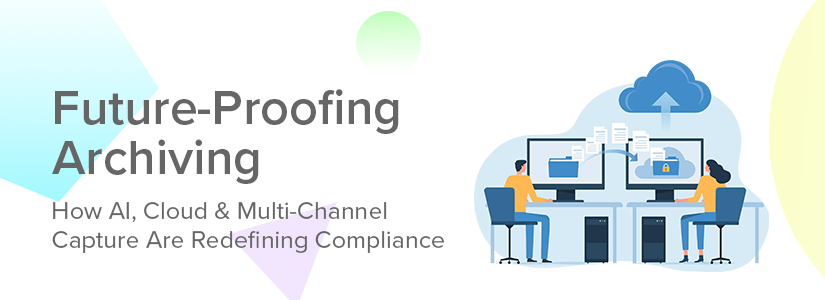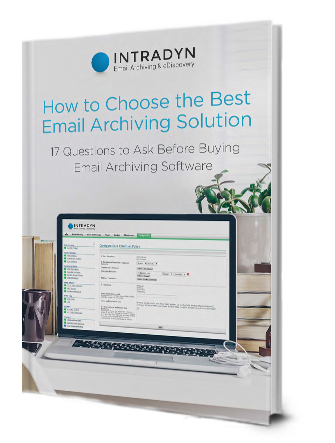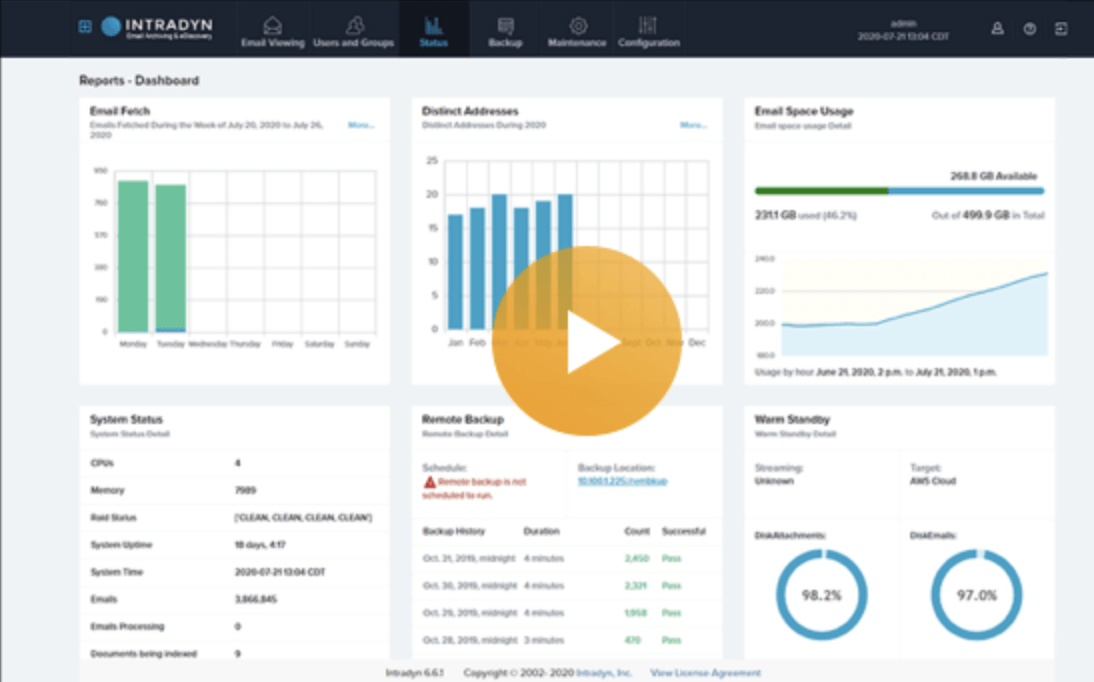Future-Proofing Archiving: How AI, Cloud & Multi-Channel Capture Are Redefining Compliance

As the digital workplace evolves, organizations are no longer just relying on email. From Slack to WhatsApp, today’s communication landscape is complex—and archiving it all is more critical than ever.
From email and instant messaging to collaboration platforms and mobile apps, modern businesses are utilizing a broader range of tools than in the past. Modern archiving focuses on gathering various forms of communication data, while adhering to regulatory standards, and utilizing advanced tools such as artificial intelligence and cloud platforms to enhance workflow efficiency.
This article explores how artificial intelligence, cloud computing, and multi-channel archiving are transforming the future of email archiving—and what it means for businesses moving forward.
For a brief overview, the key developments are summarized below:
- Cloud-based archiving offers scalability, cost-efficiency, and remote accessibility—but requires careful security planning.
- Multi-channel archiving now includes not just emails, but also text messages, social media platforms, and collaboration tools.
- AI-powered search & analytics are transforming how organizations retrieve and analyze archived communications.
Why Future-Proof Email Archiving Matter
Email remains foundational, but it’s no longer the only—or even the primary—channel for many organizations as legacy archiving systems are no longer enough. As communication becomes increasingly decentralized, email archiving strategies must evolve to stay compliant, secure, and effective.
The traditional model of storing emails on-premises in fixed archives creates significant challenges including:
- Limited scalability
- High maintenance costs
- Difficulties in retrieving relevant data efficiently.
Even more critically, modern compliance regulations now require the capture and retention of a wide variety of digital communications—not just emails. As businesses adopt collaboration tools like Microsoft Teams, Slack, and WhatsApp, a failure to archive these channels can result in non-compliance, legal issues, and reputational risk.
For organizations looking to maintain compliance, manage risk, and streamline eDiscovery, having a future-ready archiving solution is no longer optional—it’s essential.
Role of AI In Modern Archiving
Artificial Intelligence (AI) plays a transformative role in email archiving and information governance.
- Traditional archiving systems = focused mainly on storage and retrieval.
- Modern AI-powered solutions = far more intelligent, capable of analyzing communications in real-time, improving classification accuracy, and reducing manual overhead.
AI-powered search tools are enhancing archiving systems with sophisticated capabilities that improve data classification, context awareness, and compliance monitoring
Key AI Innovations in Archiving:
- Predictive Search: Can suggest queries and refine search results based on historical patterns and user behavior.
- Sentiment Analysis: Helps flag emails or chats with a negative tone or emotional intensity (often useful in internal investigations or HR scenarios).
- Auto-Classification: Categorize messages and documents automatically using natural language processing (NLP), reducing manual tagging errors.
- Entity Recognition: Identify key people, places, or terms in a conversation, which aids in legal discovery.
- Anomaly Detection: Machine learning models can detect outliers or abnormal communication patterns that could indicate fraud or misconduct.
By integrating AI into the archiving process, businesses can reduce the time spent on audits and investigations and improve their ability to act on risk indicators early.
Cloud-Based Vs. On-Premise Archiving
On-premise email archiving solution stores emails and their indexed data on your organization’s physical server for easy search and access. Where cloud-based email archiving solution captures and indexes emails, storing the data securely in the cloud instead of on a physical server.
The transition from on-premise to cloud-based archiving is accelerating—and for good reason. Cloud deployments offer flexibility, scalability, and cost efficiency. Organizations no longer have to maintain physical servers or worry about expanding storage capacity. Cloud-based archiving also supports remote and hybrid workforces, enabling anytime, anywhere access to archived communications.
However, the decision to move to the cloud should not be made lightly. Factors such as data residency laws, security protocols, and vendor lock-in should be thoroughly considered.
Here’s a Brief Comparison:
Cloud-Based Archiving:
Pros:
- Scalable storage
- Lower upfront costs
- Easy remote access
- Seamless updates and patching
Cons:
- Dependence on Internet connectivity
- Data residency concerns
- Potential vendor lock-in
On-Premises Archiving:
Pros:
- Greater control over data
- Local compliance and data sovereignty
- Customizable infrastructure
Cons:
- Higher upfront costs
- Requires dedicated IT management
- Less flexible scalability
Organizations in highly regulated sectors such as healthcare, finance, and government may still prefer on-premises solutions to maintain data sovereignty and internal controls. For many mid-size and enterprise businesses, a hybrid model—where core operations remain on-premise while leveraging the cloud for scalability—offers optimal efficiency
The Rise of Multi-Channel Communication Archiving
Emails are no longer the only channel employees use to communicate. Common tools used by businesses in their daily operations include:
- Microsoft Teams
- Zoom
- Slack
These platforms generate vast amounts of business-critical data—much of which needs to be archived. Failing to record communications from these platforms can lead to regulatory non-compliance, missed insights, and legal vulnerabilities.
One notable consequence of failing to properly archive communications is the potential for severe financial penalties, as highlighted by recent SEC enforcement actions. The SEC has issued fines totaling more than $1.1 billion to companies for failing to preserve off-channel communications, including personal texting and WhatsApp messages.
Why Multi-Channel Archiving Matters
- Regulatory Requirements – Agencies like FINRA, HIPAA, and the SEC require businesses to retain all business-related communication—not just emails.
- eDiscovery Readiness – Legal teams need to be able to search across all platforms during litigation or audits.
- Internal Investigations – HR and compliance departments often rely on archived messages to investigate misconduct or verify claims.
Providing archiving capabilities that go beyond email to include social media and mobile messaging platforms, ensures your organization remains compliant across all digital communication tools.
Intradyn’s solutions now include support for archiving these multi-channel platforms, helping businesses stay ahead of modern regulatory demands. With a unified platform, IT teams can manage and retrieve records from various sources—all under one dashboard.
Compliance and Security Considerations
Compliance is one of the primary drivers of email and communication archiving. Regulations across industries are growing stricter, and penalties for non-compliance are more severe than before.
Key Compliance Frameworks:
- FINRA / SEC: Requires firms to retain & supervise electronic communications for up to 7 years.
- HIPAA: Healthcare providers must protect and retain patient communication, including electronic messages.
- GDPR: Requires organizations to preserve, retrieve, and delete personal data upon request.
- FOIA: Public entities must ensure records, including emails and messages, are retrievable and tamper-proof.
Security is equally vital, and archiving systems should be equipped with the following features:
- WORM (Write Once Read Many) storage to prevent tampering
- Encryption at rest and in transit
- Comprehensive audit trails
- Access control and user activity logs
Modern archiving solutions must offer robust compliance and security features while maintaining usability and searchability for legal and IT teams. Metadata plays a crucial role in ensuring archived communications are defensible in court or during audits. It includes timestamps, sender and recipient details, IP addresses, and message status—all essential for verifying authenticity. As the need for enhanced compliance and security continues to grow, organizations are increasingly turning to advanced technologies to meet regulatory demands. By 2026, 60% of regulated organizations will have integrated compliance-centric AI into their archiving and monitoring systems.
Preparing for the Future of Archiving
With the convergence of AI, cloud technologies, and multi-channel communications, the future of archiving is evolving into a more complex and vital process.
Here’s how organizations can stay ahead:
- Conduct a communication audit: What platforms are your employees using?
- Assess gaps in your current archiving strategy: Are social media and mobile channels being captured?
- Evaluate AI capabilities: Can your current solution support advanced search and filtering?
- Review compliance exposure: Are you meeting all regulatory requirements?
- Consider a hybrid deployment: Cloud for scalability, on-prem for control
Intradyn’s unified archiving platform helps organizations stay ahead of these trends with advanced features like AI-enhanced search, multi-channel capture, and customizable deployment models.
Final Thoughts
Email archiving has expanded beyond emails to include a broader range of communication channels. As the communication landscape evolves, businesses must rethink how they capture, store, and analyze digital interactions. AI, cloud-based infrastructure, and multi-channel support are not just trends—they’re necessities.
Whether you’re a small business or a large enterprise, preparing now will not only help ensure compliance but also drive operational efficiency and reduce long-term risks.
To learn more about future-proofing your organization’s digital communications, visit Intradyn’s blog for insights, tools, and solutions!
Summary of the Main Points
- AI innovations like predictive search and sentiment analysis are transforming how organizations archive and analyze communications.
- Cloud-based archiving offers scalability, cost-efficiency, and remote access, but organizations must consider data security, compliance, and vendor risks
- AI is transforming archiving with tools like predictive search, sentiment analysis, auto-classification, and anomaly detection to improve compliance and reduce manual work.
- Archiving must now extend beyond email to include mobile messages, social media, and collaboration tools.
- Businesses must archive more than just emails—platforms like Slack, Teams, WhatsApp, and social media are now critical communication channels that require proper archiving.
- Regulatory compliance is essential, with frameworks like FINRA, HIPAA, GDPR, and FOIA requiring secure, retrievable, and tamper-proof records.
- Organizations should adopt flexible, future-ready solutions to meet emerging archiving challenges.
FAQ
Why are businesses moving toward cloud-based archiving?
Because it offers lower upfront costs, flexible storage, easier access for remote teams, and seamless updates—though it’s important to consider data residency and vendor lock-in risks.
Why is multi-channel communication archiving important?
Modern workforces use tools like Slack, Teams, WhatsApp, and social media, not just email. Archiving across all these platforms ensures compliance, protects against legal risks, and supports internal investigations.
How does AI improve the email archiving process?
AI enhances archiving by enabling predictive search, sentiment analysis, auto-categorization, anomaly detection, and entity recognition—helping reduce manual work and flag potential risks early.
What security features should an archiving system have?
Look for WORM (Write Once Read Many) storage, encryption in transit and at rest, access control, audit trails, and detailed metadata capture to ensure legal defensibility and protection.
Is a hybrid archiving model a good option?
Yes. Many organizations use a hybrid approach—keeping core systems on-premise for control while leveraging the cloud for scalability and flexibility.
What does Intradyn offer?
Intradyn offers a powerful, unified archiving platform that supports email, social media, mobile messaging, and collaboration tools. It uses AI for smarter searches, and risk detection, and gives organizations the flexibility to choose between cloud, on-premise, or hybrid deployment—helping them meet compliance needs while simplifying data management.


